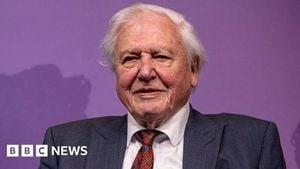On December 14, 2023, significant strides were announced in cancer treatment with the development of a free vaccine based on mRNA technology, set to be adopted across Russia. Leading these efforts is Andrey Kaprin, the chief oncologist of the Ministry of Health, who confirmed the vaccine would be available free of charge to patients, alleviating the financial burden of cancer treatments.
This innovative vaccine, crafted through collaborative efforts between scientific teams at the Gamaleya Center and the A.A. Herzen Moscow Research Institute of Oncology, alongside the N.N. Blokhin National Medical Research Center of Oncology, signifies hope for many undergoing the trials of cancer. Kaprin stated the production cost of the vaccine would total roughly 300,000 rubles per patient, explained as being absorbable by the state under the promise of offering treatments at no cost for patients.
“На потоке, когда технология будет налажена, мы где-то на 300 тысяч рублей должны будем выходить (я для государства имею в виду), для пациентов это, конечно, должно быть бесплатно,” explained Kaprin during his address. This collaborative endeavor stresses the accessibility of cancer medications, mirroring trends seen internationally but with the focus on the Russian populace.
Kaprin noted the historical trends of oncology drugs often being prohibitively expensive when first introduced. He emphasized the intent behind this vaccine is not to create treatment options “для избранных” or for the privileged few, but rather to democratize access to life-saving medicines.
According to reports by INTERFAX, Kaprin conveyed, “Вакцина против рака на мРНК-платформе для каждого пациента будет обходиться государству примерно в 300 тыс. рублей,” reiterates the commitment to affordable healthcare as the state takes on the burden of production costs.
With regard to the vaccine’s development, progress has already been made as preclinical trials showed promising results. The research highlighted significant advancements, particularly with aggressive forms of adenocarcinoma. Encouragingly, during tests on animals, the vaccine proved effective, slowing tumor growth and achieving reductions of 75-80% under controlled conditions.
“Создадим персональные вакцины от рака при помощи искусственного интеллекта,” stated Alexander Gintsburg, leading researcher behind the Gamaleya Center, advocating for the infusion of technological innovation to refine treatment methodologies.
Innovative approaches play pivotal roles as the developed vaccine promises to tailor treatments according to the unique genetic make-up of tumors specific to individual patients. Such personalized approaches are set to align with the global shift toward targeted therapies, fundamentally reshaping cancer management protocols.
Meanwhile, clinical trials are set to commence shortly, with the intention to recruit participants spanning ages 18 to 75 with confirmed cancer diagnoses. These trials aim to assess the vaccine’s efficacy and safety comprehensively. Importantly, patients with active chemotherapy will not be eligible to participate, underscoring the careful consideration of patient safety and treatment integrity.
The anticipated rollout of the vaccine is planned for early 2025, positioning Russia as a frontrunner among nations innovatively addressing cancer treatment accessibility. The governmental push to introduce such advanced therapies forms part of broader health initiatives envisioned by President Vladimir Putin earlier this year, where he underscored Russia's commitment to combating cancer.
Overall, this development marks not just the creation of another vaccine, but signifies potential transformation within how cancer treatments will be perceived and delivered realistically. The underlying principle of fostering broad-based healthcare access resonates throughout this initiative, burdened with hope for the countless patients battling cancer throughout Russia.
Those interested should stay attuned to forthcoming announcements as patient recruitment for clinical trials and subsequent availability of the vaccine will soon take center stage, paving the way for revolutionary approaches within oncological therapies.



